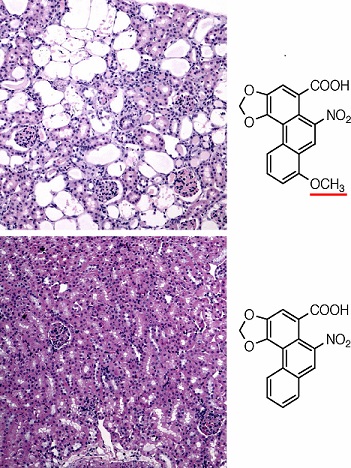Mechanism of Nephrotoxicity
Dickman and Sidorenko
 In addition to being a urothelial carcinogen, aristolochic acid (AA) is a powerful and remarkably selective nephrotoxin, and we are actively seeking its mechanism of action. The chronic renal failure caused by AA is severe and irreversible, and patients with this disease often require dialysis therapy or a kidney transplant to survive. The kidney is the sole target organ of AA toxicity, and within the kidney, necrotic and apoptotic cell death occurs exclusively in the proximal tubule. This nephron segment is particularly prone to toxic injury due its important role in urinary elimination of drugs and other xenobiotics. Excretion some of these foreign compounds is mediated by a family of organic anion transport proteins localized to the proximal tubule. We have shown that these transporters have a remarkably high affinity for AA, in the sub-micromolar range, and concentrate the toxin inside proximal tubule cells, providing one basis for site-selective toxicity.
In addition to being a urothelial carcinogen, aristolochic acid (AA) is a powerful and remarkably selective nephrotoxin, and we are actively seeking its mechanism of action. The chronic renal failure caused by AA is severe and irreversible, and patients with this disease often require dialysis therapy or a kidney transplant to survive. The kidney is the sole target organ of AA toxicity, and within the kidney, necrotic and apoptotic cell death occurs exclusively in the proximal tubule. This nephron segment is particularly prone to toxic injury due its important role in urinary elimination of drugs and other xenobiotics. Excretion some of these foreign compounds is mediated by a family of organic anion transport proteins localized to the proximal tubule. We have shown that these transporters have a remarkably high affinity for AA, in the sub-micromolar range, and concentrate the toxin inside proximal tubule cells, providing one basis for site-selective toxicity.
Having established how AA gains entry into its target cells, our research is now focused on identification of the molecular events that lead to proximal tubule cell death. At first glance, genomic DNA damage would appear to be an obvious mechanism of toxicity, and while this is surely the basis for the urothelial cancer caused by AA, it is not the proximate cause of kidney disease, as we have identified AA structural analogs that are genotoxic but not nephrotoxic. Currently, we are using a variety of custom-synthesized chemical tools, in combination with proteomics and genomics, to identify the genes, proteins and cellular pathways engaged in the initiation and progression of toxicity.
- Chang S-Y., Weber E.J., Sidorenko V.S., Rosenquist T.A., Dickman K.G., Grollman A.P., Kelly E.J., Himmelfarb J., Eaton D.L. Human liver-kidney model elucidates the mechanisms of aristolochic acid nephrotoxicity. JCI Insights 2(22), 2017. PMID29202460
- Priestap HA, Torres MC, Rieger RA, Dickman KG, Freshwater T, Taft DR, Barbieri MA, and Iden CR. Aristolochic acid I metabolism in the isolated perfused rat kidney. Chem Res Toxicol 25:130-9, 2012. PMID22118289
- Dickman KG, Sweet DH, Bonala R, Ray T, and Wu A. Physiological and molecular characterization of aristolochic acid transport by the kidney. J Pharmacol Exp Ther 338:588-97, 2011. PMID21546538
- Dickman KG and Grollman AP. Nephrotoxicity of Natural Products: Aristolochic Acid and Fungal Toxins. In: Comprehensive Toxicology, Vol. 7: Renal Toxicology (2nd ed.), ed. R Schnellmann, Elsevier:Oxford, pp. 433-458, 2010.
- Shibutani S, Dong H, Suzuki N, Ueda S, Miller F, and Grollman AP. Selective toxicity of aristolochic acids I and II. Drug Metab Dispos 35:1217-22, 2007. PMID17392392

